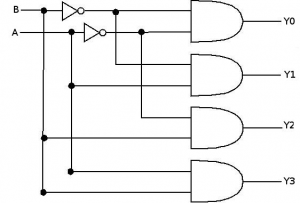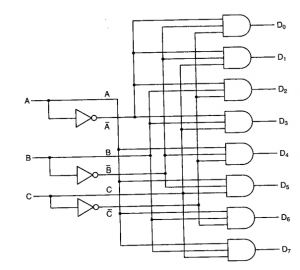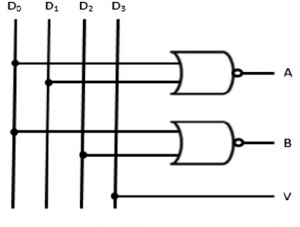
Code Conversion
The availability of a large variety of codes for the same discrete elements of information results in the use of the different codes by different digital systems. It is sometimes necessary to use the output of one system as input to another. There two types of code conversion.
A conversion circuit must be inserted between the two systems if each uses different codes for the same information. Thus a code conversion is a circuit that makes the two systems compatible even though each uses a different binary code.
Decoder circuit
The combinational circuit that detects the presence of a specified combination of codes on its inputs and indicates the presence of that code by specified output level.
- Converts a set of digital signals into correspondence decimal code.
- Receive ‘n’ input and produce ‘2^n’ number of outputs.
There are three types of decoder
- 2 to 4 line decoder
- 3 to 8 line decoder
- 4 to 16 line decoder
2 to 4 line decoder
Receives 2 inputs line and provides four outputs lines.

3 to 8 line decoder
Receives three inputs line and provides eight outputs lines.

4 to 16 line decoder
Receives four inputs lines and provides sixteen output lines.

Encoder circuit
An encoder is a digital circuit that performs the inverse operation of a decoder. An encoder has 2n
(or
fewer) input lines and n output lines. The output lines generate the binary code corresponding to
the input value.
o An example of an encoder is the octal-to-binary encoder which has eight inputs, one for
each of the octal digits, and three outputs that generate the corresponding binary number.
There are three types of Encoder
- 4 to 2 line encoder
- 8 to 3 line encoder
- 16 to 4 line encoder
4 to 2 line encoder
Receives four inputs line and provides two outputs lines.

8 to 3 line encoder
Receives eight inputs line and provides three outputs lines.

16 to 8 line encoder
Receives sixteen inputs line and provides eight outputs lines.
You may also like Combinational Circuit || Combinational Logic || Bcis Notes

Leave a Reply